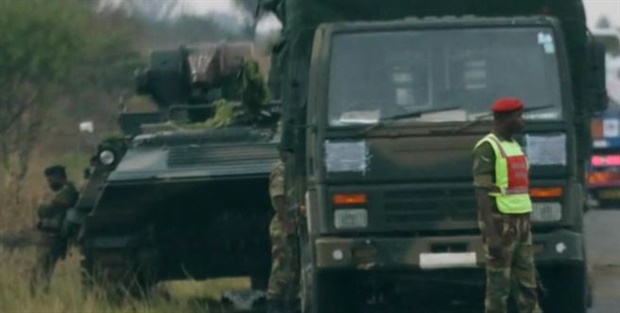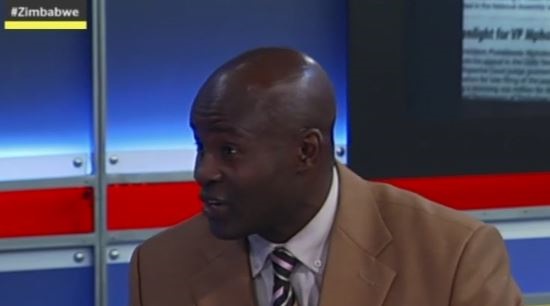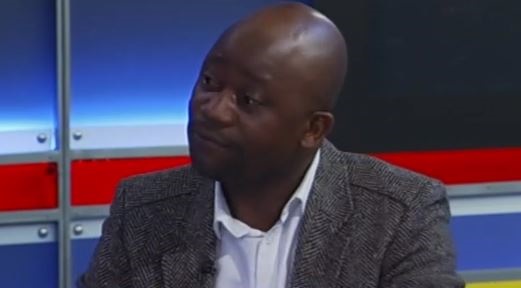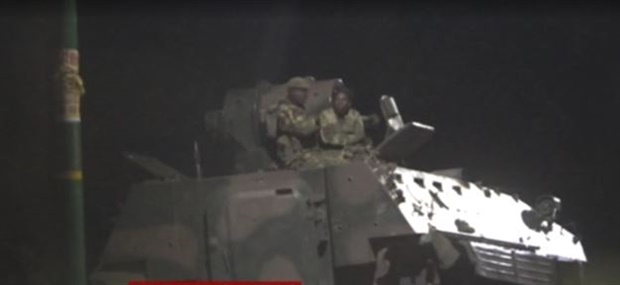Reports indicate that soldiers have taken over Zimbabwe's ZBC
state broadcaster, compounding speculation of a coup against President
Robert Mugabe, 93. Follow Live updates.

![]()
![]()
![]()

![]()
![]()
08:40
On the ground I am now in town. State owned radio stations
now only playing war time songs (songs that we used to play during the
liberation struggle as well as the statement by the military.
In the CBD army tanks are blocking all roads that lead to the official president's office, the Munhumutapa Building. They are also blocking roads leading to the Parliament Building, the High Court and the Defence Forces House.
I am also told that there is heavy army presence to the road that leads to the President's rural Home in Zvimba, to the west of Harare in the Mashonaland West Province.
Some parents have also prevented their children from going to school especially schools in Northern Suburbs and those close to the CBD.
But at the moment it's all still calm with people going about their business although the volume of traffic is minimal. - Zimbabwe journalist Crecey Kuyedzwa in Harare
In the CBD army tanks are blocking all roads that lead to the official president's office, the Munhumutapa Building. They are also blocking roads leading to the Parliament Building, the High Court and the Defence Forces House.
I am also told that there is heavy army presence to the road that leads to the President's rural Home in Zvimba, to the west of Harare in the Mashonaland West Province.
Some parents have also prevented their children from going to school especially schools in Northern Suburbs and those close to the CBD.
But at the moment it's all still calm with people going about their business although the volume of traffic is minimal. - Zimbabwe journalist Crecey Kuyedzwa in Harare

08:36
Local flight operators say it is business as usual for now,
as speculation of coup in Zimbabwe continues.
Videos posted to twitter show that entry to Robert Gabriel Mugabe (RGB) International Airport is currently being monitored by Zimbabwean military.
There have been conflicting reports regarding flight operations from Harare since the Zimbabwean military started sending tanks into the capital on Tuesday and have since taken over the public broadcaster, ZBC.
Videos posted to twitter show that entry to Robert Gabriel Mugabe (RGB) International Airport is currently being monitored by Zimbabwean military.
There have been conflicting reports regarding flight operations from Harare since the Zimbabwean military started sending tanks into the capital on Tuesday and have since taken over the public broadcaster, ZBC.
08:32
Elections probably won't be held as scheduled, Rashweat
Mukundu, an analyst with the Harare-based Zimbabwe Democracy Institute, said by
phone.
"The military is going to determine the shape of Zimbabwean politics, although they've tried to say this is not a coup," he said.
"This may result in the creation of a new unity government which will involve the opposition."
"The military is going to determine the shape of Zimbabwean politics, although they've tried to say this is not a coup," he said.
"This may result in the creation of a new unity government which will involve the opposition."
08:31
The
country is now under military rule, said Alex Magaisa, a Zimbabwean law
lecturer who is based in the UK and helped design Zimbabwe’s 2013
constitution. “When you see a man in uniform reading news on national
television, you know it’s done,” he said in a text message. “There are no
more questions. Authority is now in the hands of the military.”
08:19
Adriaan Basson:
Verified reports confirm that Mugabe has negotiated for Grace to leave the country while he prepares to step down.
Press conference tomorrow afternoon. Soldiers indeed have the president and his presidential guard under siege. Zimbabweans are urged to stay away from the CBD tomorrow until further notice
Verified reports confirm that Mugabe has negotiated for Grace to leave the country while he prepares to step down.
Press conference tomorrow afternoon. Soldiers indeed have the president and his presidential guard under siege. Zimbabweans are urged to stay away from the CBD tomorrow until further notice

07:58
Zimbabwe's military seizes power, threatening Mugabe's rule
The armed forces seized power in Zimbabwe after a week of confrontation with President Robert Mugabe’s government and said the action was needed to stave off violent conflict in the southern African nation that he’s ruled since 1980.
The armed forces seized power in Zimbabwe after a week of confrontation with President Robert Mugabe’s government and said the action was needed to stave off violent conflict in the southern African nation that he’s ruled since 1980.
07:38
The Zimbabwe army's takeover of the state broadcaster and
action against some members of President Robert Mugabe's government has been
praised by the chair of the Liberation War Veterans' Association.
Chris Mutsvangwa, head of the war veterans' group issued a statement from Johannesburg praising Army General Constantino Chiwenga for carrying out "a bloodless correction of gross abuse of power". The statement said the army will return Zimbabwe to "genuine democracy".
Mutsvangwa and the war veterans' group are staunch allies of Emmerson Mnangagwa, who was fired from his post of vice president by Mugabe last week - AP
Chris Mutsvangwa, head of the war veterans' group issued a statement from Johannesburg praising Army General Constantino Chiwenga for carrying out "a bloodless correction of gross abuse of power". The statement said the army will return Zimbabwe to "genuine democracy".
Mutsvangwa and the war veterans' group are staunch allies of Emmerson Mnangagwa, who was fired from his post of vice president by Mugabe last week - AP
07:08
Army General SB Moyo guarantees safety of Robert Mugabe,
saying that the army is "gathering criminals around him"




